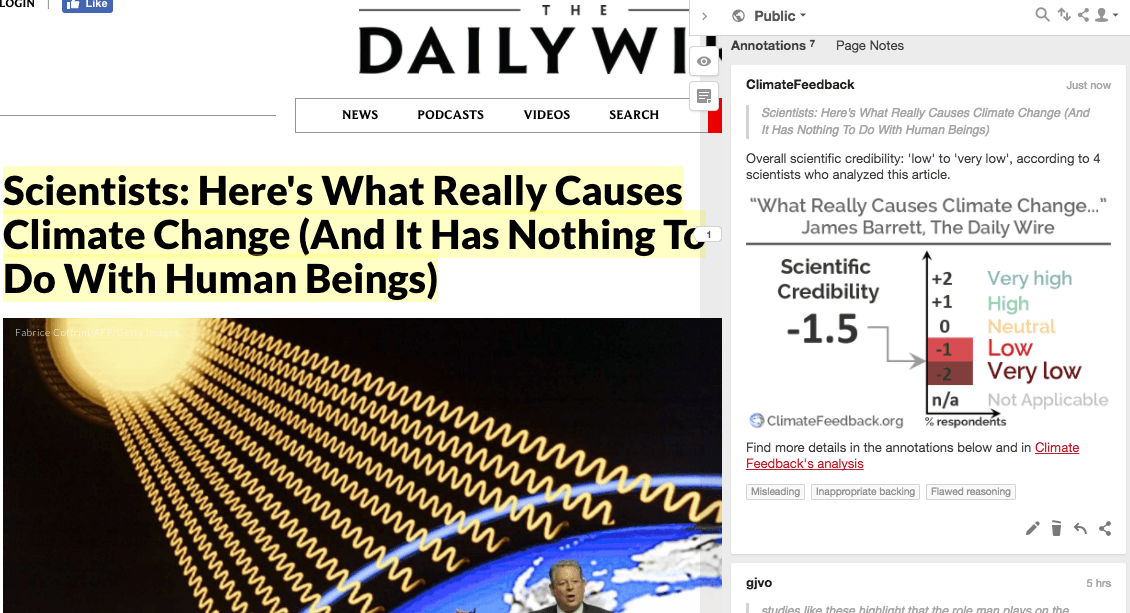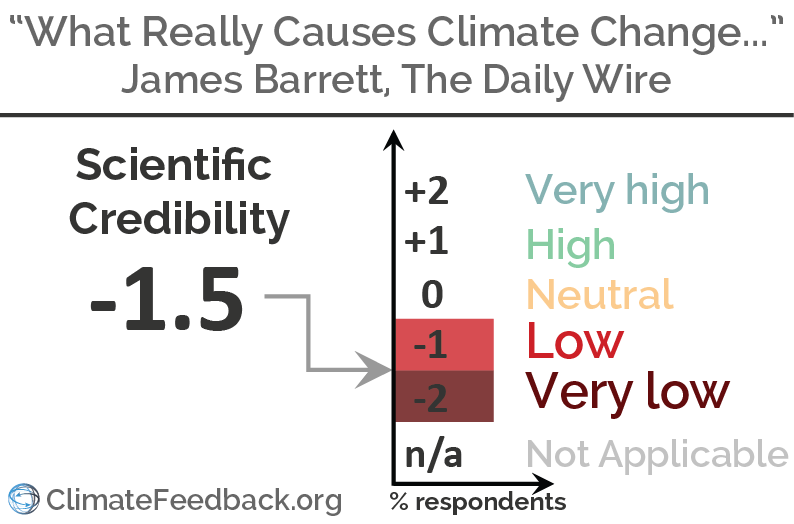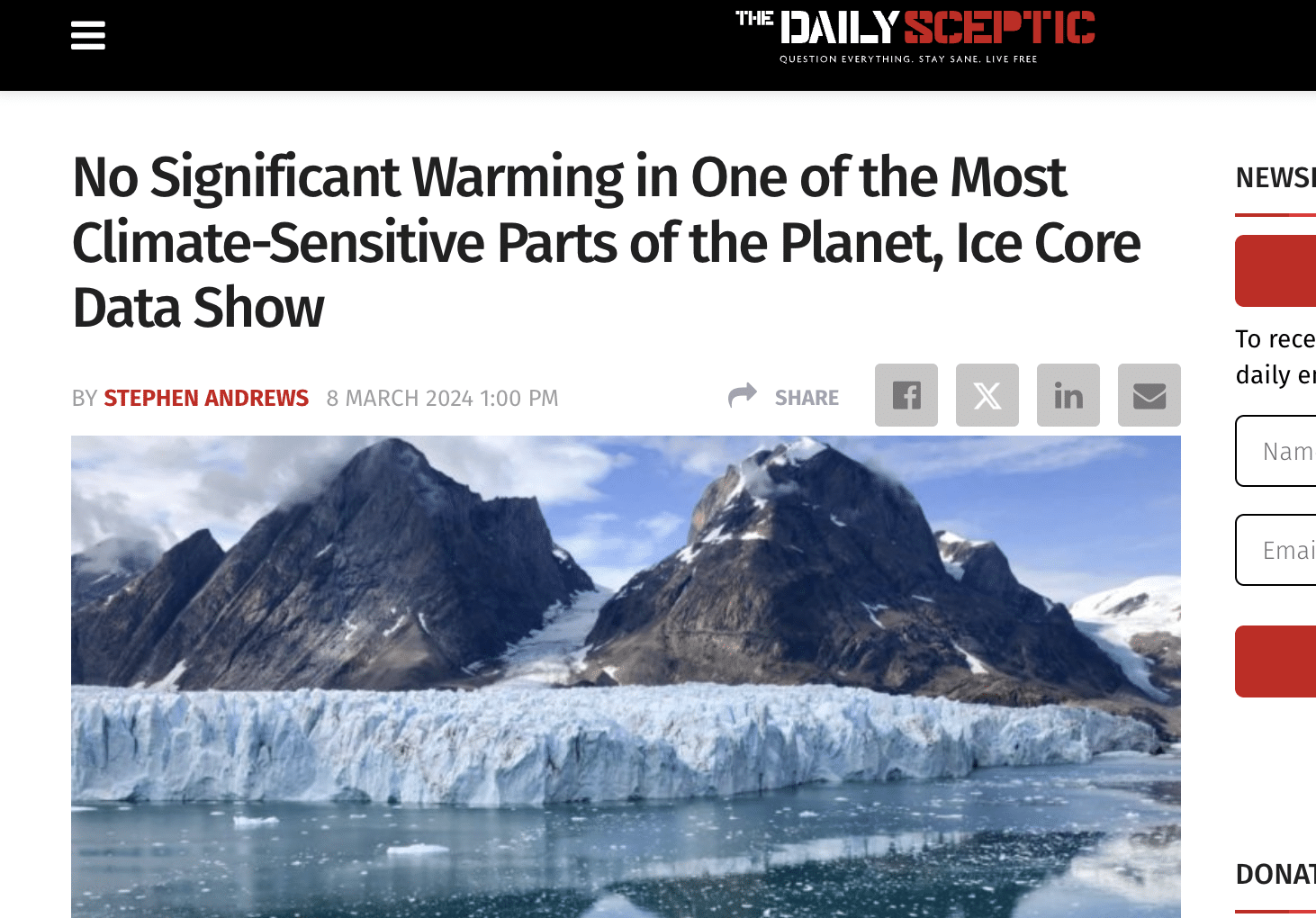- Climate
Analysis of "Scientists: Here's What Really Causes Climate Change (And It Has Nothing To Do With Human Beings)"
Reviewed content

Published in The Daily Wire, by James Barrett, on 2017-02-24.

Scientists’ Feedback
SUMMARY
This post at The Daily Wire, which has been widely shared on Facebook, claims that a recent study of variations in Earth’s orbit recorded by 90 million-year-old rocks provides evidence against a human cause of current global warming.
Scientists who reviewed the post found that it misrepresented the study’s implications for modern climate change, as well as the timeframes that the study is relevant to. In reality, the gradual cycles in Earth’s orbit are much too slow to be responsible for the warming of the last couple centuries. Climate research has shown that these orbital changes and other natural factors do not explain modern warming.
All the reviewers also indicate that the title of the article is not supported by its content.
See all the scientists’ annotations in context
UPDATE (07 March 2017): The original article has been edited to correct some of the statements highlighted here. Read more
REVIEWERS’ OVERALL FEEDBACK
These comments are the overall opinion of scientists on the article, they are substantiated by their knowledge in the field and by the content of the analysis in the annotations on the article.

Senior Scientist, Commissariat à l'Energie Atomique
Although the main body of the article may be a fair description of a scientific paper, the conclusion that anthropogenic climate change is dwarfed by natural variations is extremely misleading and certainly not in the original paper.
The original scientific paper discusses climate variations over millions of years. The causes for recent climate change involves processes that are very different.

Senior Scientist, Potsdam Institute for Climate Impact Research (PIK)
The reasoning in this biased article is flawed. The fact that orbital variations can cause climate change does not imply “that the role man plays on the planet is dwarfed by natural phenomena”.

Senior Lecturer, University College London
It’s strange how research into how planets orbit within our solar system has ended up being used to downplay the anthropogenic role in climate change. The research is about a geologic time period without ice-ages, yet that seems to be the confused reasoning for the article’s conclusion. The incorrect link to completely different research in the Nature journal about ice-ages betrays this confusion.

Senior researcher, KNMI (The Royal Netherlands Meteorological Institute)
The article misuses a Nature article on a geological process 90 millions years ago to argue the warming of the past century is not anthropogenic. It seems the reasoning is ideologically motivated rather than based on reality.
Notes:
[1] See the rating guidelines used for article evaluations.
[2] Each evaluation is independent. Scientists’ comments are all published at the same time.
Key Take-aways
The statements quoted below are from the article; comments and replies are from the reviewers.
“While evidence that the earth’s orbital variations impact radiation levels and thus global temperatures does not of course mean that man is not in some way impacting the climate, studies like these highlight that the role man plays on the planet is dwarfed by natural phenomena utterly out of our control.”

Senior researcher, KNMI (The Royal Netherlands Meteorological Institute)
Over geological time scales, indeed. However, the rise in temperature of 1 degree Celsius over the last two hundred years is not on a geological time scale, and is not caused by natural phenomena out of our control as suggested here. Both from the negative (there are no natural forcings on the climate that would have produced such heating over the last century) and from the positive (the heating is pretty much what we expect from greenhouse gases minus aerosols) the evidence is very strong that humans are responsible for most of the trend over the last 100 years.

Senior Lecturer, University College London
I’m not sure how they come to this conclusion. The increase in global temperature from the depth of the last glacial (22,000 years ago) to preindustrial times is about 4.5°C. This is less than the warming projected for the end of the century, if we choose to ignore man’s responsibility as the author suggests. Clearly if we do act to limit the warming to 2°C, then the glacial change would be bigger than it, but the timespans involved mean that current climate change is still a happening at a faster rate.
“[…]an explanation of the fluctuations of the earth’s temperatures that global warming alarmists are going to make sure to bury: The cycle of changes in the climate over the millennia is a result of changes in the amount of solar radiation, in part caused by small changes in the orbits of Earth and Mars.”

Senior Lecturer, University College London
This is the accepted explanation for periodic past changes in Earth’s climate. We spend multiple classes explaining this to our students. We certainly do not bury it.
“changes in the climate over the millennia”

Senior researcher, KNMI (The Royal Netherlands Meteorological Institute)
This is false. The article is about changes in climate 90 million years ago at geological time scales, much slower than the “millennia” referred to here.
“While the notion that the impact on earth’s orbital cycle on solar radiation levels is the most significant factor determining global temperatures is anything but new, the team of scientists seem to have tied the phenomenon to planetary orbits in a more concrete manner than previous studies.”

Senior Lecturer, University College London
I can’t help but think this sentence really refers to a research article called “A simple rule to determine which insolation cycles lead to interglacials” by Tzedakis and colleagues, rather than “Theory of chaotic orbital variations confirmed by Cretaceous geological evidence” by Ma, Meyers & Sageman.
“In an article summarizing the scientists’ findings, which were originally published this week in the journal Nature, the University of Wisconsin-Madison notes that the study ‘provides the first hard proof for what scientists call the ‘chaotic solar system,’ a theory proposed in 1989 to account for small variations in the present conditions of the solar system.”

Senior Lecturer, University College London
Neither the linked article nor this Daily Wire news item relate to the research linked in Nature [which is the Tzedakis et al paper rather than Ma et al].



